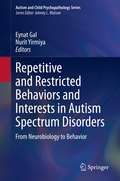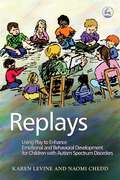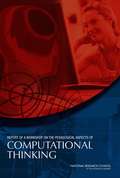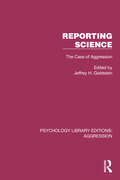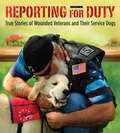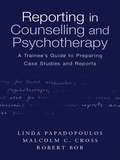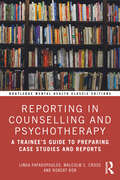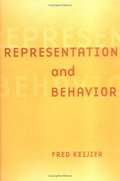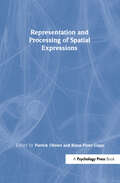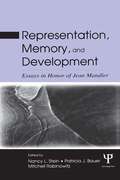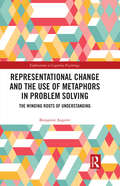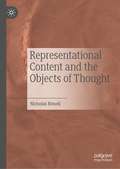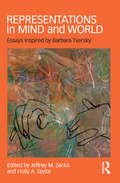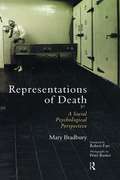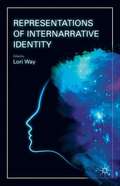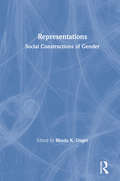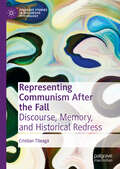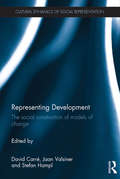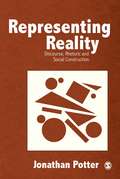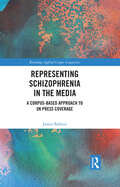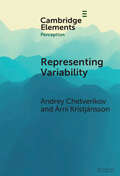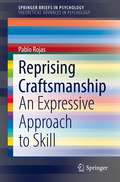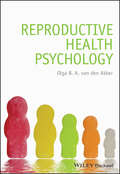- Table View
- List View
Repetitive and Restricted Behaviors and Interests in Autism Spectrum Disorders: From Neurobiology to Behavior (Autism and Child Psychopathology Series)
by Nurit Yirmiya Eynat GalThis volume examines repetitive and restrictive behaviors and interests (RRBIs) affecting individuals with autism spectrum disorder (ASD). The various aspects of RRBIs, an umbrella term for a broad class of behaviors linked by repetition, rigidity, invariance, and inappropriateness to place and context are reviewed by an international team of expert leaders in the field. Key topics of coverage include:Neurological Mechanisms Underlying Repetitive: Animal and human modelsUnderlying mechanisms of RRBs across typical and atypical developmentThe relationship between RRBI and other characteristics of ASD (communication, social, sensory aspects) RRBIs and adults with ASDDiagnosing RRBIs An RRBI intervention modelThe book bridges the gap between the neurobiological and neurocognitive bodies of knowledge in relation to RRBIs and their behavioral aspects and examines associations with other domains of ASD. In addition, the volume addresses related assessment and treatment of RRBI in ASD. This is an essential resource for researchers, graduate students, clinicians and related therapists and professionals in developmental psychology, behavioral therapy/rehabilitation, social work, clinical child and school psychology, child and adolescent psychiatry, pediatrics, occupational therapy and special education.
Replays: Using Play to Enhance Emotional and Behavioural Development for Children with Autism Spectrum Disorders
by Karen Levine Naomi CheddReplays addresses the challenging behaviors of children with autism spectrum disorders through interactive symbolic play. It shows parents and professionals how to help children access their emotions, whether the child is verbal or not, cognitively able or impaired, even-tempered or volatile. The chapters introduce and show readers how to implement Replays, and describe ways of adapting this intervention to address specific issues in different settings and circumstances. Levine and Chedd present more than just behavioral management strategies in the context of social, emotional and communication development: they have developed a technique that helps children to re-experience, play through and master the complex emotional response states that often lead to ongoing behavioral challenges. Replays is an easy and fun tool that provides numerous step-by-step examples and illustrations. It enables parents and professionals to guide children with autism spectrum disorders towards mastering, and changing, their emotional and behavioral responses.
Report of a Workshop of Pedagogical Aspects of Computational Thinking
by The National Academy of SciencesIn 2008, the Computer and Information Science and Engineering Directorate of the National Science Foundation asked the National Research Council (NRC) to conduct two workshops to explore the nature of computational thinking and its cognitive and educational implications. The first workshop focused on the scope and nature of computational thinking and on articulating what "computational thinking for everyone" might mean. A report of that workshop was released in January 2010. Drawing in part on the proceedings of that workshop, Report of a Workshop of Pedagogical Aspects of Computational Thinking, summarizes the second workshop, which was held February 4-5, 2010, in Washington, D. C. , and focuses on pedagogical considerations for computational thinking. This workshop was structured to gather pedagogical inputs and insights from educators who have addressed computational thinking in their work with K-12 teachers and students. It illuminates different approaches to computational thinking and explores lessons learned and best practices. Individuals with a broad range of perspectives contributed to this report. Since the workshop was not intended to result in a consensus regarding the scope and nature of computational thinking, Report of a Workshop of Pedagogical Aspects of Computational Thinking does not contain findings or recommendations.
Reporting Mental Illness in China (Routledge/Asian Studies Association of Australia (ASAA) East Asian Series)
by Guy RamsayThis book examines how Chinese-language newspapers across greater China report on severe mental illness, and why they do so in the ways they do, given that reporting in local newspapers can strongly influence how Chinese readers view the illness. By assessing how the reporting in three leading broadsheet newspapers from mainland China, Hong Kong, and Taiwan constructs the illness, the book considers how the distinct social and political histories of the three culturally Chinese communities shape the reporting, and whether it bears out or contests the intense stigma against the illness that prevails locally. The findings can usefully encourage and inform attempts to humanise, include, and empower those with a severe mental illness across greater China and the global Chinese diaspora. Employing a well-tested, transparent discourse analytic approach, the book also includes numerous Chinese-English bilingual news report extracts to illustrate its claims. As such, Reporting Mental Illness in China will be of interest to sinologists, discourse analysts, mental health professionals and public health authorities across the globe, especially in places where there are large Chinese-speaking populations.
Reporting Science: The Case of Aggression (Psychology Library Editions: Aggression)
by Jeffrey H. GoldsteinOriginally published in 1986, this is a nonscientific book about science. It is concerned with the relationships among social science, journalism, public information, and public policy. Reporting Science: The Case of Aggression explores some of the obstacles – and suggestions for overcoming them – to the mutual exchange of information when that information concerns research and theory on a sensitive issue, in this instance, violence.Among the issues explored are: What is the social scientist’s responsibility, if any, for the public dissemination of his or her work? How accurate are mass media reports of scientific research on such socially sensitive issues as violence and the effects of mass media portrayals of sex and aggression? How do science journalists select particular pieces of research for study? How can interested scientists more effectively present their work to the public? What are the ethical issues involved in greater scientist-journalist cooperation?
Reporting for Duty: True Stories of Wounded Veterans and Their Service Dogs
by Tracy J. LibbyInspirational accounts of veterans who have moved forward from mental and physical injuries toward healthier lives with the help of service dogs. Hundreds of thousands of military veterans seek treatment for post-traumatic stress disorder (PTSD) each year. Service dogs have been used for many years in the civilian sector to help their disabled owners perform necessary tasks in daily life; likewise, the organized use of therapy dogs to bring comfort and companionship to hospital and nursing-home patients dates back more than four decades. Reporting for Duty explores the unique and special bond between wounded warriors—especially those suffering from PTSD—and their service dogs and discusses the vital work of therapy dogs who visit VA hospitals and military rehabilitation facilities. Author Tracy Libby tells the true stories of disabled veterans who have been touched, assisted, and enriched by the dogs in their lives, and the new lease on life is reciprocal: many of these service and therapy dogs have been rescued from shelters and specially trained for their jobs. A portion of proceeds from the sale of this book will benefit a veterans&’ service-dog organization.Inside Reporting for Duty . . .True stories of physically and mentally disabled veterans who count on service dogs for assistance with daily tasksAn explanation of PTSD and how it affects military veteransHow therapy dogs and service dogs are selected and trained for their jobsRescuing shelter dogs to train for therapy and service workHow the military is training dogs to accompany soldiers on deploymentsA look at the bond between people and dogs and the positive effects it has on both
Reporting in Counselling and Psychotherapy: A Trainee's Guide to Preparing Case Studies and Reports
by Linda Papadopoulos Robert Bor Malcolm CrossTrainee therapists need to show practical competence through the production of client reports and case studies. Reporting in Counselling and Psychotherapy is a unique hands-on guide to this element of practical work. Using clinical examples to guide the reader, and a detailed analysis of case study and process report writing, it will show how to present clear, concise and properly presented reports. The book will be an invaluable tool, not only for those embarking on practical training in psychotherapy, counselling and psychology, but also for trainers in these areas and for clinicians writing clinical reports or case presentations.
Reporting in Counselling and Psychotherapy: A Trainee's Guide to Preparing Case Studies and Reports (Routledge Mental Health Classic Editions)
by Linda Papadopoulos Robert Bor Malcolm C. CrossShowing practical competence through the production of client reports and case studies is a key aspect of training therapists and other mental health professionals. This Classic Edition of Reporting in Counselling and Psychotherapy offers a unique hands-on guide to this element of practical work. Using clinical examples to guide the reader, and a detailed analysis of case study and process report writing, it shows readers how to present clear, concise and properly presented reports.This book remains an invaluable tool, not only for those embarking on practical training in psychotherapy, counselling and psychology, but also for trainers in these areas and for clinicians writing clinical reports or case presentations.
Representation and Behavior
by Fred A. KeijzerFred Keijzer stresses that representations are the starting point for a set of processes that lead back to the external environment. They are used as theoretical components within an explanation of a person's outwardly visible behavior.
Representation and Processing of Spatial Expressions
by Patrick Olivier Klaus-Peter GappCoping with spatial expressions in a plausible manner is a crucial problem in a number of research fields, specifically cognitive science, artificial intelligence, psychology, and linguistics. This volume contains a set of theoretical analyses as well as accounts of applications which deal with the problems of representing and processing spatial expressions. These include dialogue understanding using mental images; interfaces to CAD and multi-media systems, such as natural language querying of photographic databases; speech-driven design and assembly; machine translation systems; spatial queries for Geographic Information Systems; and systems which generate spatial descriptions on the basis of maps, cognitive maps, or other spatial representations, such as intelligent vehicle navigation systems. Though there have been many different approaches to the representation and processing of spatial expressions, most existing computational characterizations have so far been restricted to particularly narrow problem domains, usually specific spatial contexts determined by overall system goals. To date, artificial intelligence research in this field has rarely taken advantage of language and spatial cognition studies carried out by the cognitive science community. One of the fundamental aims of this book is to bring together research from both disciplines in the belief that artificial intelligence has much to gain from an appreciation of cognitive theories.
Representation, Memory, and Development: Essays in Honor of Jean Mandler
by Patricia J. Bauer Nancy L. Stein Mitchell RabinowitzA festschrift to honor Jean Mandler, this volume contains contributions from leading scholars focusing on the child's development of memory, visual representation, and language. It is appropriate for students and researchers in cognitive psychology, language acquisition, and memory.
Representational Change and the Use of Metaphors in Problem Solving: The Winding Roots of Understanding (Explorations in Cognitive Psychology)
by Benjamin AngererThis book addresses a longstanding impasse in problem solving research: if structured mental representations of problems are required for solving them, how do those arise and, if needed, change? The book argues that established theories underestimate this question due to methodological requirements. Proposing to momentarily suspend these requirements, including the focus on well-defined puzzle tasks, the book suggests to alternatively conduct exploratory studies with more complex, open-ended problems. It presents a qualitative case study of participants working for several days on a mental paper folding task designed to challenge them to construct their own representations. Charting their use of gestures, metaphors, and ever more complex descriptions, it carefully traces the chronology of their thinking. Combining in-depth empirical investigation with theory-building, the book proposes a framework of problem solving that goes beyond established models, accommodating associative, motivational, and affective factors. This book will be of great interest to researchers, academics, and postgraduate students in the fields of cognitive science, psychology, philosophy of mind and cognition, and cognitive artificial intelligence.
Representational Content and the Objects of Thought
by Nicholas RimellThis book defends a novel view of mental representation—of how, as thinkers, we represent the world as being. The book serves as a response to two problems in the philosophy of mind. One is the problem of first-personal, or egocentric, belief: how can we have truly first personal beliefs—beliefs in which we think about ourselves as ourselves—given that beliefs are supposed to be attitudes towards propositions and that propositions are supposed to have their truth values independent of a perspective? The other problem is how we can think about nonexistents (e.g., Santa Claus) given the widespread view that thought essentially involves a relation between a thinker and whatever is being thought about. The standard responses to this puzzle are either to deny that thought is essentially relational or to insist that it is possible to stand in relations to nonexistents. This book offers an error theory to the problem. The responses from this book arise from the same commitment: a commitment to treating talk of propositions—as the things towards which our beliefs are attitudes—as talk of entities that actually exist and that play a constitutive and explanatory role in the activity of thought.
Representations in Mind and World: Essays Inspired by Barbara Tversky
by Jeffrey M. Zacks Holly A. TaylorThis volume pulls together interdisciplinary research on cognitive representations in the mind and in the world. The chapters—from cutting-edge researchers in psychology, philosophy, computer science, and the arts—explore how structured representations determine cognition in memory, spatial cognition information visualization, event comprehension, and gesture. It will appeal to graduate-level cognitive scientists, technologists, philosophers, linguists, and educators.
Representations of Death: A Social Psychological Perspective
by Mary BradburyDrawing upon a rare and highly original ethnography of contemporary mortuary practices, Representations of Death takes the reader through the medical, bureaucratic, commercial and ritual aspects of death Going behind the scenes at hospitals, funeral parlours, crematoria and cemeteries, as well as holding poignant, in-depth interviews with bereaved women, Bradbury has been able to illuminate the very different perspectives of the deathwork professional and the grieving relative. Illustrated with stunning photographs, this fascinating book makes a significant contribution to the growing literature in death studies.
Representations of Internarrative Identity
by Lori WayBased upon Ajit Maan's groundbreaking theory of Internarrative Identity, this collection focuses upon redefining self, slave narrative, the black Caribbean diaspora, and cyberspace to explore the interconnection between identity and life experience as expressed through personal narrative.
Representations: Social Constructions of Gender
by Rhoda UngerDeveloped from an edited series of journal articles into a larger collection with a clear identity and emphasis all its own-one need only browse through the Table of Contents. "The divided lives of women in literature ," "Case studies of agency and communion in women's lives," "A sense of humor," "Dialogue with Guatemalan Indian women," "Coping with rape," "Earliest memories: Sex differences and the meaning of experience," "Women's explanations for job changes," "Androgyny and the life cycle: The Bacchae of Euripides" -these are but a few of the topics represented in this diverse and interesting collection. What, then, binds these essays together? First and foremost, this is a book of stories about women, about the conflicts, choices, and opportunities that are present in the lives of women, both real and imagined.
Representing Communism After the Fall: Discourse, Memory, and Historical Redress (Palgrave Studies in Discursive Psychology)
by Cristian TileagăThis book explores the contribution of discursive psychology and discourse analysis to researching the relationship between history and collective memory. Analysing significant manifestations of the moral vocabulary of the Romanian transition from communism to democracy, the author demonstrates how discursive psychology can be used to understand some of the enduring and persistent dilemmas around the legacy of communism. This book argues that an understanding of language as an action-oriented, world-building resource can fill an important gap in the theorizing of public controversies over individual and collective meaning of the recent (communist) past. The author posits that discursive social psychology can serve as an intellectual and empirical bridge that can overcome several of the difficulties faced by researchers working in transitional justice studies and cognate fields. This reflective book will appeal to students and scholars of transitional justice, discursive psychology, memory studies, and the sociology of change.
Representing Development: The social construction of models of change (Cultural Dynamics of Social Representation)
by Jaan Valsiner David Marco Carre Stefan HamplRepresenting Development presents the different social representations that have formed the idea of development in Western thinking over the past three centuries. Offering an acute perspective on the current state of developmental science and providing constructive insights into future pathways, the book draws together twelve contributors with a variety of multidisciplinary and international perspectives to focus upon development in fields including biology, psychology and sociology. Chapters and commentaries in this volume present a variety of perspectives surrounding social representation and development, addressing their contemporary enactments and reflecting on future theoretical and empirical directions. The first section of the book provides an historical account of early representations of development that, having come from life science, has shaped the way in which developmental science has approached development. Section two focuses upon the contemporary issues of developmental psychology, neuroscience and developmental science at large. The final section offers a series of commentaries pointing to the questions opened by the previous chapters, looking to outline the future lines of developmental thinking. This book will be of particular interest to child psychologists, educational psychologists and sociologists or historians of science, as well as academics and students interested in developmental and life sciences.
Representing Reality: Discourse, Rhetoric and Social Construction
by Jonathan Potter`This is an admirable book which can be recommended to students with confidence, and is likely also to become an indispensable source of reference for those researching fact construction' - Discourse & Society How is reality manufactured? The idea of social construction has become a commonplace of much social research, yet precisely what is constructed, and how, and even what constructionism means, is often unclear or taken for granted. In this major work, Jonathan Potter offers a fascinating tour of the central themes raised by these questions. Representing Reality overviews the different traditions in constructionist thought. Points are illustrated throughout with varied and engaging examples taken from newspaper stories, relationship counselling sessions, accounts of the paranormal, social workers' assessments of violent parents, informal talk between programme makers, political arguments and everyday conversations. Ranging across the social and human sciences, this book provides a lucid introduction to several key strands of work that have overturned the way we think about facts and descriptions, including: the sociology of scientific knowledge; conversation analysis and ethnomethodology; and semiotics, post-structuralism and postmodernism.
Representing Schizophrenia in the Media: A Corpus-Based Approach to UK Press Coverage (Routledge Applied Corpus Linguistics)
by James BalfourThis book presents a critical analysis of ways in which schizophrenia and people with schizophrenia are represented in the press. Interrogating a 15-million-word corpus of news articles published by nine UK national newspapers over a 15-year period, the author draws on techniques from corpus linguistics and critical discourse analysis to identify the most frequent and salient linguistic features used by journalists to influence and reflect broader public attitudes towards people with schizophrenia. In doing so this book: Evaluates the extent to which media representations are accurate and the extent to which they are potentially helpful or harmful towards people living with schizophrenia; Employs a bottom-up approach guided by linguistic patterns, such as collocates and keywords, identified by corpus software; Contributes to the de-stigmatisation of schizophrenic disorder by unveiling some of the widespread misconceptions surrounding it; Applies a mixed-methods approach in order to expose attitudes and beliefs found ‘between the lines’ – values and assumptions which are often implicit in the way language is used and therefore not visible to the naked eye. The findings of this monograph will be relevant to advanced students and researchers of health communication, corpus linguistics and applied linguistics and will also carry importance for journalists and mental health practitioners.
Representing Variability: How Do We Process the Heterogeneity in the Visual Environment? (Elements in Perception)
by Andrey Chetverikov Árni KristjánssonThe visual world is full of detail. This Element focuses on this variability in perception, asking how it affects performance in visual tasks and how the variability is represented by human observers. The authors highlight different methods for assessing representations of variability and suggest that understanding visual variability can be elusive when straightforward explicit methods are used, while more implicit methods may be better suited to uncovering such processing. The authors conclude that variability is represented in far more detail than previously thought and that this aspect of perception is vital for understanding the complexity of visual consciousness.
Reprising Craftsmanship: An Expressive Approach to Skill (SpringerBriefs in Psychology)
by Pablo RojasCraftsmanship provides an insight into an inherently human dimension of work resulting from our immersion in an occupation or profession. The present book illustrates and defines the vital, social, aesthetic, and ethical dimensions involved in craftsmanship, which rejects a dissociation between handwork and wit, or between action and thought. This also contrasts with the neglect contemporary psychology has shown toward craftsmanship and its reduction to mere ‘human factors.’ Drawing on artistry as an emblem, the present account conveys that skilful action can only be renewed in a cycle involving both the personal and the transgenerational. There is little doubt in psychological and anthropological literature that the current global crises cannot be separated from social predicaments; namely, from the commodification of craftsmanship. In this book, the development of skilful action attests to a fundamental involvement required to sustainably perpetuate human endeavours. The role of expressivity in reappropriating technical activity is key in showing the continuous revaluation of our ethics and aesthetics of work, practice, and creation. The overall arc of the volume shows a movement from responsivity to responsibility. In short, if we are to reformulate our relationship to work and craft, we need to see through our responsibility in technique. The particularities of craftsmanship described here aim to contribute to such reformulation.
Reproduction of Tactual Textures
by Michaël WiertlewskiTexture accounts for an important part of the realism of simulated experiences, and it is most certainly true during tactile interaction. We usually experience roughness by running our fingers onto the explored surface. The perception of this fine texture is mediated by the vibrations generated by the encounters of the skin and the asperities of the surfaces. Reproduction of Tactual Textures presents factors that contribute to the mechanics of the interaction between a bare finger and a surface with a view to their artificial reproduction. It discusses the recording and reproduction of tactual textures, and analyses a case study of the development of a device able to record the vibratory signal from a fingertip sliding over a textured surface. The same device is then used in a reverse way to render those previously measured signals to the user's fingertip. These developments open new questions about the biomechanical properties of the skin and their relation to perception. The second half of Reproduction of Tactual Textures focuses on the implication of the dynamic parameters of the skin onto rendering performance, and it concludes with a study on the important features that are present in the vibratory signal and their relation to texture perception. This state-of-the-art volume highlights the importance of the mechanics and biomechanics during the haptic exploration of surfaces and their possible contribution to perception. Collectively, the findings reported are pertinent to many applications, including robotic perception and the design of effective virtual reality systems.
Reproductive Health Psychology
by Olga B. van den AkkerThis volume provides a comprehensive, up-to-date theoretical and empirical background to the psychology of reproductive health. Provides a life span perspective of the psychology of reproductive health and its disorders, from menarche to menopause and reproductive health in older ageFocuses on issues of the individual's reproductive health experience, including reproduction, pregnancy, maternity, and birth, as well as conditions such as PMDD, dysmenorrhea, and events including pregnancy failure, and abortionAcknowledges the wider social context with discussions of poverty, inequality, educational and economic status, age, and urban versus rural accessAddresses life style related factors, human rights to choice, information and access, fertility control and reproductive health regulation and health care servicesIllustrates topics with empirical data supported with tables and figures
